
Nothing like the smell of coffee in the morning! Whether you’re opening a bag of beans, watching drip coffee accumulate in a pot, or hanging a percolator over an open fire – coffee creates feelings of warmth and comfort. Knowing how to store coffee long term is essential for anyone wanting to enjoy a cup of it during times of instability.
Coffee isn’t essential to survival, but as a prepper, it’s a comfort food I’d like to enjoy (and share) in any grid-down, post-collapse situation. Naturally, I wanted to stock plenty of coffee so I set about researching various ways to have coffee stocked in my prepper pantry.
I know I’m not alone here. Food and Wine magazine cites a survey that says 64% of Americans drink a cup of coffee every day. More than just a personal comfort food, in a societal collapse coffee could become a very valuable barter good. Look back at the value coffee had during the Civil War as an example.
Coffee Goes Bad Over Time
Time is the enemy of us all. It breaks our bodies down and it certainly has an effect on coffee beans. It’s not just time, however. Coffee contains oils that can go rancid when exposed to air for extended periods. This is why ground coffee and beans are sold in vacuum sealed bags.
While coffee can go “bad” if stored in poor conditions over time, it can certainly lose its flavor and aroma well before going bad. You ca still drink it, but will it taste good? Unlikely. That process takes time, however, and if stored properly, you can dramatically extended the life of your coffee.
Shelf Life Varies
Coffee’s shelf life varies depending on the type of coffee you’re storing and the conditions under which you’re storing it.
Ground Coffee
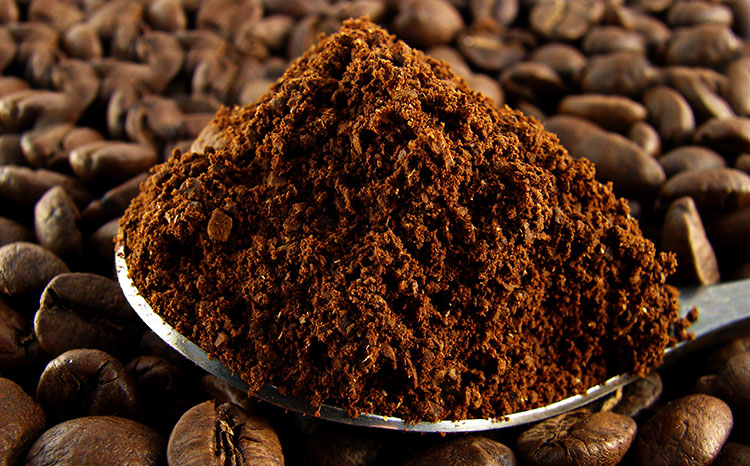
Ground coffee is certainly convenient. Just open the package and scoop it into your coffee maker. This is perfectly find for daily use. Regular coffee drinkers will never have to worry about ground coffee going bad because they’ll go through it fast enough.
- Unopened Ground Coffee: Lasts around 5 months.
- Opened Ground Coffee: Lasts around 4 months.
Ground coffee has the shortest shelf life because grinding the bean into tiny pieces exposes so much of it to air. It’s the same idea with hamburger. A medium rare steak is safe to eat but medium rare burger is not, because the inner parts of the steak were not exposed to air whereas all parts of hamburger have been exposed to air.
Ground coffee will certainly still be safe to drink, but the odds that you’ll actually enjoy drinking it plummet dramatically if too much time passes.
Roasted Beans
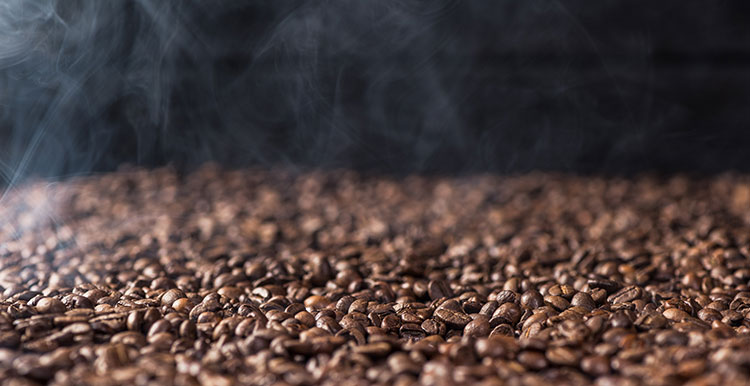
Roasted beans will last longer than ground coffee because less of the bean has been exposed to air. This gives whole beans an advantage in long term storage, and it’s why coffee aficionados will often buy whole beans and grind them at home. They make for a fresher cup of coffee!
However, roasting beans exposes them to heat which causes the bean to start breaking down. If you’ve never tried roasting your own beans I’d suggest giving it a go. You’ll see the bean go through the heat-driven chemical reaction process that causes the bean to crack.
- Unopened Roasted Beans: Lasts 18-24 months.
- Opened Roasted Beans: Lasts 8-12 months.
Instant Coffee
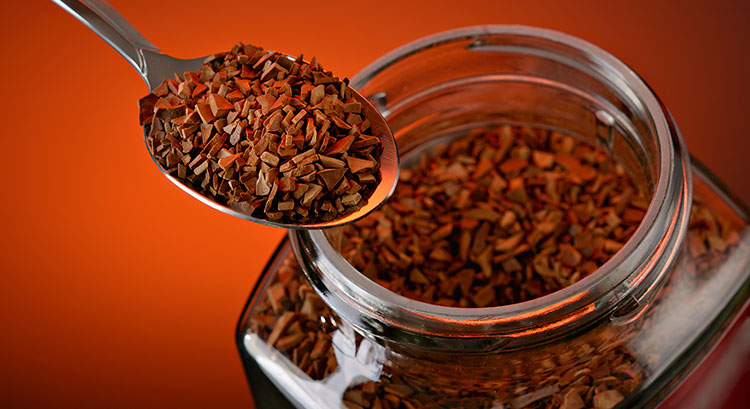
It seemed like instant coffee has fell out of favor over the years. Perhaps that’s because it falls out of flavor. I remember my parents, and my friends’ parents, all scooping instant coffee into a cup of hot water as their preferred way of making coffee. Fast and easy!
My guess is that people don’t use instant coffee as much these days simply because it doesn’t taste as good as other methods of making coffee, but for the prepper, instant coffee comes with a much longer shelf life. That’s because instant coffee is creating through freeze drying, which removes nearly all of the moisture from the coffee.
- Unopened Instant Coffee: Lasts up to 20 years.
- Opened Instant Coffee: Varies significantly, but expect 5-10 years.
Green Beans
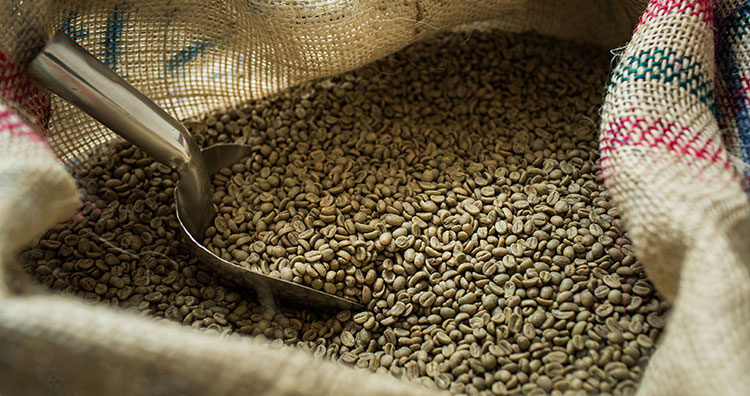
Buying and storing green coffee beans will bring your long term coffee storage to a whole new level (more on that in a moment). The advantage to green beans is that they have not been exposed to the heat that the roasting process involves. That makes their oils more stable.
- Sealed the way I describe below: Lasts 20+ years.
- Opened: Lasts around 1 year for best flavor.
2 Storage Options for the Short Term
The following 2 options are suitable for shorter-term storage and are going to serve most people well for daily consumption. They will extend the shelf life (and taste) of the coffee you buy at the grocery store.
1 – Air-Tight Containers
Ground coffee may be the most convenient, but it’s the least favorable way to store coffee long term. Once opened, ground coffee should be used within 1 to 2 weeks. Take it out of the container it came in and place it in an airtight coffee container.
Whole beans are going to last longer than ground coffee. There’s less surface area for the whole bean to begin breaking down than there is when the bean is ground.
Roasted beans are still roasted, however, and roasted beans are intended to be consumed, not stored for the long term. Storing roasted beans is like storing cooked food. You can do it, but food keeps a lot longer when stored fresh from the outset.
Note: Do not refrigerate it. Due to its porous nature it will pick up moisture and flavor from anything else you might have in there (fish, for example).
2 – Freeze It
If your ground coffee bag is unopened, you can keep it in a freezer, but there is not widespread consensus on whether this makes the most sense. You’ll find people saying yes, others saying no.
Coffee absorbs moisture (and odors) from the air, and where virtually all containers will let moisture in, you end up – eventually – with freezer burn. This will take months, however. A true coffee connoisseur will notice a breakdown in taste over time if it’s stored in a freezer (source).
2 Storage Options for the Long Term
If you want to do the prepper way, you need to think outside the average person’s approach listed above. When we talk about “long term” in the prepper sense we are talking about years, not months. This is not something you can accomplish with grocery store-purchased ground coffee or whole roasted beans.
1 – Buy Prepper Coffee
The easiest, fastest way to build up your supply of emergency coffee is to buy it outright. My Patriot Supply sells freeze-dried emergency food, but they also sell Franklin’s Finest Emergency Coffee, which has a 25-year shelf life. This is what I call “prepper coffee” (read my taste test).
Franklin’s is billed as “the first ever emergency survival coffee” providing a one-year supply of Franklin’s Finest Coffee for one person. The supply comes conveniently packages in twelve resealable 60-serving, heavy-duty 4-layer zipper pouches. This gives you a total of 720 servings. Now that’s survival!
2 – Seal Green Coffee Beans
This approach will give you the longest-lasting coffee without having to buy instant/freeze-dried coffee. It will involve having the equipment/skill to roast your own beans (more on that in a moment).
There are 4 steps to storing coffee beans long term:
- Start with fresh, green coffee beans.
- Place the beans in a Mylar bag with O2 absorbers.
- Seal the bag and label it.
- Be prepared to roast and grind beans.
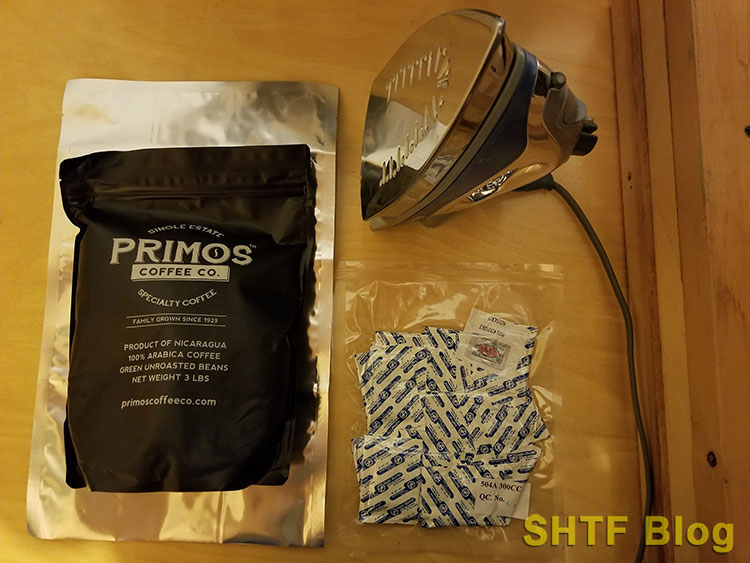
Preppers will know this type of storage strategy already, but let’s break it down into more detail for those who might not.
Step 1: Start with Fresh, Green Coffee Beans
For the ultimate way to achieve long-term coffee storage, you have to start with the freshest beans you can find. Unless you live on a coffee plantation, that means buying unroasted, green beans. You’re probably not going to be buying these at your local Starbucks, but you can order them online. There are all types of varieties to be had.
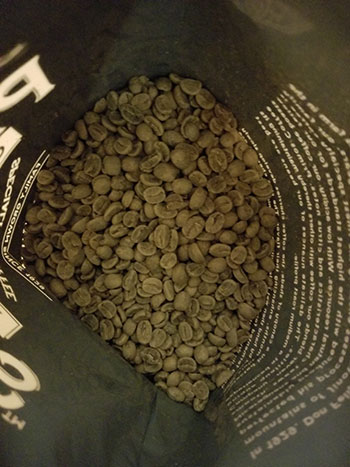
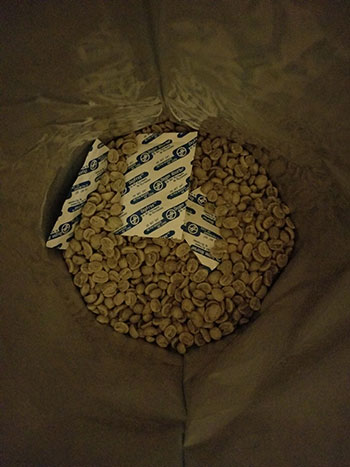
Unroasted beans are apt to last a year or more under normal circumstances. We are not going for “normal” circumstances, however. We are creating a much better environment for beans to last longer by protecting them oxygen and light.
Step 2: Place the Beans in a Mylar Bag with O2 Absorbers
Coffee beans’ greatest enemies are air, moisture, and light. Oxygen absorbers and Mylar bags will protect your beans from enemies. The absorbers remove the oxygen and moisture, and the bags facilitate a proper seal and protect them from the light.
So, you start by transporting those beans from the bag they came in to a Mylar bag with O2 absorbers. Place an absorber in the bottom of the bag and a few at the top. If you are unsure how many to use, check an oxygen absorber chart on our long-term rice storage article. Alternatively, you can just do what I do and throw in more than you know is necessary.
An alternative to Mylar bags is to use a quality vacuum sealer to remove the air. It’s the only way to be sure. Then you want to store the beans in a dry area away from the light. Call it overkill, but I would still place an O2 absorber in it just the same
- RELIABLE VACUUM SEALER: This KOIOS vacuum sealer machine can complete the vacuum sealing in 8-12 seconds. It can keep food fresh for 8 times longer. Not only save your time and money, but also enhance...
- WET/DRY MODE WITH ONE TOUCH: Just put your bag into the machine, and choose the Dry/Moist mode, it will start to vacuum and seal automatically.Tips: It will take a longer time to seal moist food than...
- EXTERNAL MANUAL VAC: The vacuum packing machine can be connected to the crisper containers, bags, and wine stopper via the vacuum tube to reduce oxidation or prevent evaporating. With the Manual and...
- BUILT-IN CUTTER DESIGN: The electric food vacuum sealer machine built-in a sliding cutter, you can get a smoother customized bag by just cutting it. Tips: Press down the cutter button hard, then slide...
Step 3: Seal the Bag and Label It
Mylar bags seal with heat; i.e. a standard clothes iron. Lay the bag on its side, hand squeeze as much air out as you can, make sure there are no stray beans where you are going to heat seal the bag, and then run a hot iron across the end, sealing it tight.
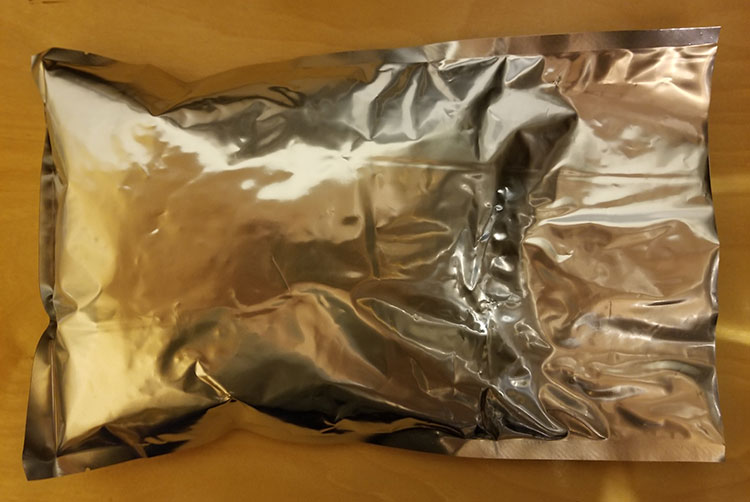
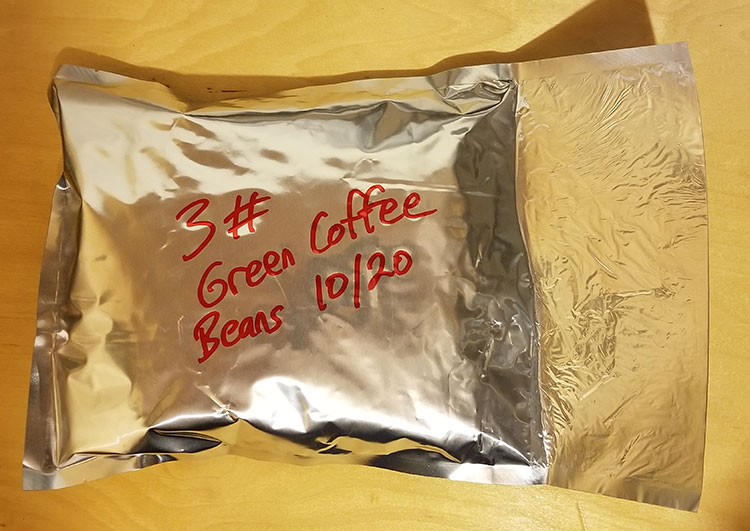
If your coffee is part of a larger long-term food storage plan, be sure to label the bag so you know 1) what is in the bag, and 2) when it was sealed shut. When you have a lot of foods stored in Mylar bags it will be very easy to forget what is what, and dating the seal will assure you are properly rotating stock.
Then you just need to wait around 4 hours for the oxygen absorbers to work their magic.
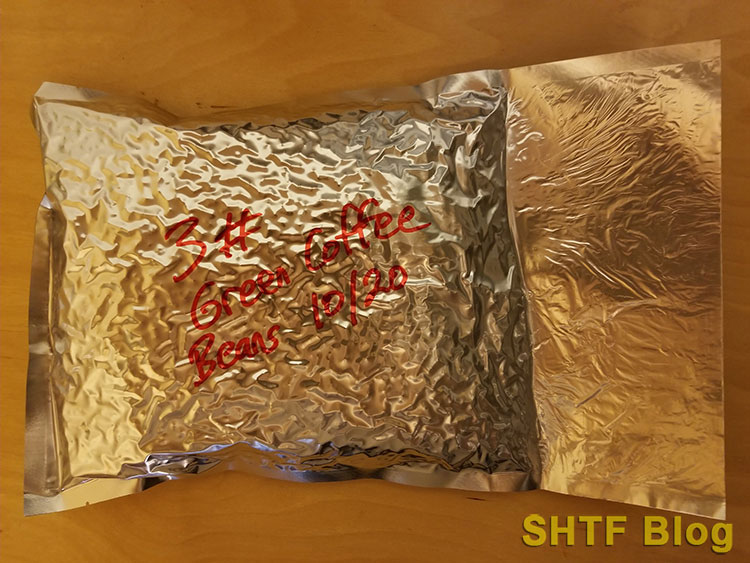
Congratulations! Your coffee beans are now in a great position to maximize their shelf life. But what happens when you need to open the bag to brew fresh coffee? It’s not just like you’re going to put them in your auto-drip coffee maker. This isn’t ground coffee. Those beans haven’t even been roasted. You need to…
Step 4: Be Prepared to Roast and Grind Beans
This means you have to roast them yourself. This is a whole other process that you will want to learn, and to do so, read my post on off-grid coffee roasting and brewing.
In a nutshell, the beans can be roasted in a skillet or you can buy a coffee roaster. A simple ceramic coffee roaster will cost you about thirty dollars. A fancier model will cost you well over one-hundred dollars.
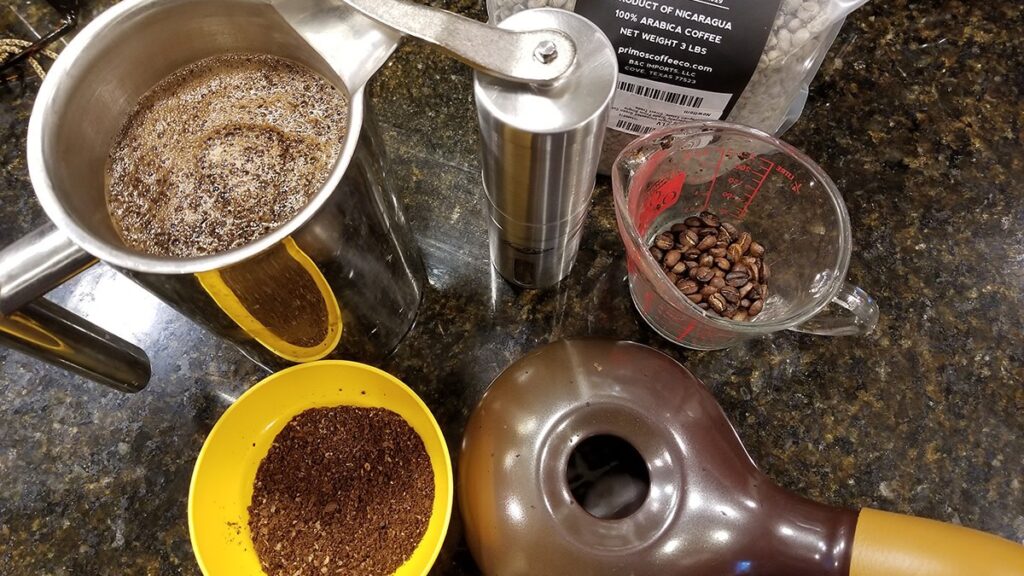
You’re not going to be able to replicate the roasting process of a large commercial roaster in a skillet or a ceramic roaster, but a fancier model will make a much better, more fresh roast that is hard to beat… unless the power goes out! That’s when you’ll be using a ceramic roaster or cast iron skillet, and if you are storing prepper coffee, that’s what you’re going for anyway.
The same goes for grinding coffee beans. You can buy a basic electric grinder, but again, if the power goes out… well, then you’ll need a hand-crank grinder. I prefer those, but in a pinch, you can always crush the roasted beans in some other, more primitive fashion. They won’t be very uniform that way, and thus lack in perfected taste, but you’ll get the caffeine you need.
How to Store Coffee Long Term Summary
I’ve got a couple of the #10 cans full of coffee in my basement that I’ve had for a long while with my other #10 cans. I decided to try a can of French Roast. If it’s French roast it can’t be half bad right? Ha! It tasted terrible.
You don’t want to drink nasty coffee today, so you certainly won’t want to drink if after the apocalypse. Follow the steps I outlined on how to store coffee long term and you will be a post-apocalyptic coffee master… at least, until you run out of beans.

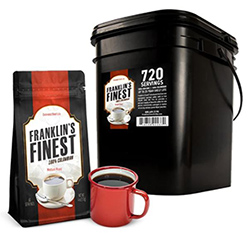


101 comments
Why would you want to purchase preground coffee? You are paying for the service of someone grinding your coffee when you could either grow your own coffee depending on climate and harvest it annually or you could buy bulk unground beans and then can them, only taking a month’s supply out at a time and grinding it yourself.
There is no secret to grinding coffee, they sell stainless steel grinders that you can mount on your wall.
I actually have a small electric grinder. Maybe I’ll go back to using it. It seemed like a hassle every time I had to use it, but when freshness is at stake accept no subsititute!
I have stored Folgers flaked Crystal coffee for years. in a pinch it will work. I have drank coffee out of c rations that was 20 years old. Again, it will work in a pinch.
You’re not “growing your own”..just saying,
look it up..it is a huge undertaking that will start out at a five year growing process.
Ironically, I was talking with a guy running a coffee shop earlier this week and he said his distributor anticipated that coffee prices would double by June. He was looking at the distributor’s memo as he told me.
Adding fuel to that fire, sugar prices are also going through the roof:
https://www.business-standard.com/india/news/global-price-spike-revives-demand-for-sugar-exports/423984/
I’m a coffee crack head, but have recently cut my traditional afternoon coffee. Now I drink water in the afternoon instead. Doing this cut my coffee expense in half! 😉
Go ahead RM. Kick me while I’m down.
When I was in the Army in the early 80’s we got C-rations from Vietnam era. The instant coffee was horrid unless you boiled it from a couple minutes, then it was at least drinkable and the caffeine worked.
I had that same stuff in that same time frame! We went to Norway once and spent about a month out in the snowbanks. One night the cook got the great idea for everybody to bring their instant coffee packs up and he threw them all into a big vat and made a huge pot (gallons) of coffee. It was great! Well, it froze up that night and he thawed it out the next night and it was still pretty good. (Compared to not drinking coffee anyway.) He did this for SEVEN days! I’m not kidding! By the end there were pine needles and God knows what floating around. Ahhh, the good old days!
What did Eulle Gibbens say? Parts of a pine tree are edible.
another option is to get the gevalia coffee service (gevalia.com) – whole bean – in their vacuum packed “bricks” – their shape will make it easier to store efficiently, and personally speaking, it’s the best BY FAR of any coffee i’ve ever had! you can get their sample 2 lbs with coffee maker for $15 or so…
This is subscription based?
As you are undoubtedly aware, the flavor in coffee comes from the volatile oils in the beans. So, as soon as the coffee is ground it starts to lose some flavor. When ground and exposed to air the oils evaporate quickly. So, if you have whole beans in an unopened airtight container, they will last a long time. Even ground coffee in an unopened airtight container will not lose much flavor in 4-6 months. My wife is a coffee junkie and I have experimented with storage times because if collapse comes, I would rather deal with mutant ninja bikers than my wife without her coffee.
Thanks for the info. Your comment about your wife made me laugh out loud.
I don’t drink coffee but I buy it and store it for those “rainy days” ahead of us to use as a bartering item. I was enlighted about the importance of coffee having read the book Alas, Babalon by Pat Frank. After running out of coffee, the main character finds some in a stash he’d forgotten about and well, it didn’t seem to matter that it wasn’t fresh coffee only that it was coffee.
I remember reading that section with tears in my eyes. The good guys got to have coffee again after all that time. That was a great book!
The book The World Ends at Hickory Hollow by Ardath Mayhar is another fantastic read along with the book Into The Forest by Jean Hegland. Nothing like being ‘entertained’ (taught prepper skills) while reading.
I wonder how fresh coffee was in the pioneer days what with harvesting and transportation methods being what they were. I think a lot of use by dates are bunk, created to encourage tossing things and buying new. I realize that a bean picked off the bush, dried, roasted, ground, and consumed as soon as practical would be more fresh, however, three months into supply line failures I doubt anyone will be as discerning. I have heard that the vacuum sealed foil packs store very well, I place these packs in another bag and vacuum seal it at home just to provide a double layer of protection, and then toss them in a 5 gal bucket for storage. I do believe that the “pot will always be on” in a grid down situation so anyone familiar with camp coffee (and the horseshoe test) won’t be complaining anyhow.
I agree with you on the “use by” dates and I’ve got my percolater all ready to go.
Most of the use by dates are put there for company liability, because the product could have increased possibility of bacteria growth after that time. Some companies use the use by date for quality reasons too. For the most part, any canned foods that don’t have any signs of damage (dents, cracks, swelling of the can) are good for a LONG time. Someone mentioned C-rats, I remember eating Vietnam era ones when I was a kid (around the mid 80’s) and they were fine, that’s roughly 12 years and they still tasted good… well some of them did! There have been records of cans pulled up from wrecked WWII ships that have been sitting on the bottom of the ocean for 50 years which were still biologically safe to eat.
This may be the most important post since ‘the top ten guns’ from 2007. Lol.
About six months ago I was cleaning out a long-neglected deep freezer when I found a can of Hills Brothers from 2004. When I say ‘can’, I mean a real can. Unlike the newer varients, this was all metal. When I finally opened it, I still heard the pffffttttt from the vacuum seal.
It was alright. It tasted decent and smelled like coffee. To test its potency, I drank twice my usual amount. It had plenty of punch left, believe me.
So, I think freezing it will certainly extend the life a few years. Freezing sealed beans might get you even more mileage.
BTW, I once had the opportunity to drink pure chicory, which was a substitute we used down in these parts during the Yankee blockades. Can’t say I’d recommend it, as it has no caffeine. But you could stretch your supply of real coffee my adding roasted and ground chicory. In parts of Louisiana it’s a pretty standard practice. It’s also considered by some to be a natural antacid.
Keep of the great work.
Yukon
Thanks for info Yukon. It’s interesting how the packaging has changed in just a few years isn’t it?
tgj brings up a good point mentioning the oils in the coffee, that and the tannins in the beans is what gives the coffee its flavor. That being said, like other oils make sure that you store them in a cool dark place. The biggest enemy of oil in any situation (especially storage) is #1 light, #2 heat, #3 salt… these 3 factors are the most important to avoid when storing any oils, including what you use for cooking. Using whole beans and grinding them as needed will help to retain the quality of the oils in the coffee as well. Also try adjusting the temperature you brew the coffee at, the PROPER extraction temperature for both tea and coffee is about 180F. More than that and the coffee will get a burnt, muddy flavor/texture (yes coffee has texture). I only drink coffee once in a while, I would rather drink hot tea if I want a caffeine fix, but when I make it at home I use a “French press” with water that is between 175-180F and let it steep for 5 minutes. This technique will improve the flavor of even the cheapest of the cheap coffee. Even if you go to that “big name” 5 dollar cup of coffee shop (you know which one I am talking about), their extraction temperature is set to about 220F so that they can brew the coffee very fast and use less beans per cup… TO ME its not worth $.50 a cup if the coffee tastes like crap, no matter what name is on the cup!
As far as storing whole bean coffee, my folks drank a brand called Duran Coffee when we lived in Central America (we left in ’92). I found a vacuum sealed bag of Duran whole bean coffee in my folks basement storage a few years ago, ground it, brewed it and it tasted fine. It was actually better that a fresh bag of whole bean espresso roast from the previously mentioned coffee shop. I think the key to why that bag of coffee lasted so long is that it had a metallic bag, and was stored properly. Food for thought.
I forgot to mention…
The just add water single serving packs (like the Propel, or Hawaiian Punch packs) are a good option. They have instant coffee, with some “micro ground” coffee so they don’t have that funky instant coffee taste. There are also decent instant options available, my Ma is a pastry Chef (folks always wonder what got me into it!) and she uses a lot of instant coffee for flavoring various pastries and cakes. While trying to find the best instant coffee to use, we found “espresso powder” from King Aurthur Flour Co. Like I said, I don’t drink much coffee, but this stuff is actually a good cup of instant (for all the coffee snobs out there) and weighs almost nothing. I keep some in my hunting pack, back pack, emergency bag in my JEEP and first aid kit (caffeine can help with headaches).
Hey Chefbear – I was hoping you’d weigh in. I like those little coffee packs. Like you I always have at least five or six in my pack. And where are you buying coffee for .50 cents a cup??? Everywhere up here it starts at $1.60 a cup (for a decent cup) and rises quickly from there.
I was actually using the price as an example, I was just saying that I refuse to pay $5 for a cup of coffee at the Seattle based coffee giant, and to me their coffee isn’t worth $.50. It always tastes burnt and way to acidic for my taste.
BUT, there is a little family owned breakfast/lunch joint down the road from my house (inside of a 15yr old house) where they serve coffee for $.50, free refills to and its better than the previously mentioned chain coffee shop. Got the best grits, home-made bacon and fried cornmeal “mush” in town to! Yall come down to VA let me know and breakfast is on me!
Sorry thats 150yr old house, not 15yr old!
While researching coffee alternatives, my hubby learned that during the civil war the southerners would roast okra seeds, grind them, then use them for coffee. I had a lot of okra this past summer and had saved lots of seeds. We tried it and it wasn’t bad at all. But I’m still gonna try to figure out how to store the real thing for long term.
I’ve never had okra here in the north, although I did have some once down in Tennessee. It was boiled and slimy!
Sorry, got side tracked when I saw your reference to Okra. If I find out more info I’ll be sure to make another post.
Its less slimy and crunchier when you fry it. Yea, They like that stuff iin TENNESSEE;)-
They also use dried tap root from dandilions or dried roasted acorns, then grind/pestle them and use for coffee sub. Dont know why I fell in on this post I HATE coffee. I dont touch the stuff.
Thanks for this blog and the subsequent comments. As a novice prepper, I really appreciate all the information your followers have to share.
Heh, thats a canned answer, you hv to read between the lines. I would venture to say that as long as it sealed, coffee wouuld keep for a very long time. When I was a kid, my next door neighbor was WW II vet and an excellent scrounger of that era. He would get big 5 gal cans of coffee and stack them in his storage shed and use them for years at a time. That being said, I would not be affraid to use ten yr old coffee if it was sealed. This guy was old, smart and sneeky and he stored canned coffee for years at a time. Thats enough for me, hell, he even still drove a willys jeep and carried an M1 carbine. This guy was the real deal and so were his sons, decorated vets everyone. Store that coffee! Itll keep. .
Mre Depot had green coffee beans packed for long term storage.
But I don’t see them listed anymore. Maybe someone else is doing that now too.
I suggest stocking up on No-Doz, thousands of tablets, just like ammo. Maybe in .50 cal ammo cans. Put them in your five-year-old coffee, it won’t matter how it tastes at that point, but the buzz will matter. In the end, it’s the caffeine you crave.
BTW, *fried* okra is awesome.
Yes! Fried okra is DEEEEElicious
I share your concern, being a coffee junkie myself. So we got all the equipment in case SHTF: hand grinder, french press, then stocked up on green coffee beans. Actually made the best coffee I’ve had was roasting the green beans myself. If prices are going to be higher I think I will pick up a few of these cans, and some Dunkin donuts coffee too. Thanks for posting on this!!
Maybe that Tim Horton rep meant that the stuff is good for a year once you open then can? I didnt known they had outlets south of the borber .
P
Oh yeah, we’ve got Tim’s down here. My father is from Canada and we used to get TH’s coffee when we went up there and were excited when the decided to open a chain down here.
I think the woman didn’t understand what I was asking because anyone invovled in coffee knows that once you open the can you’ve only got a couple of weeks to use it.
I’m with you Spook45. If I didn’t have coffee and I found a ten year old can I’d brew it so fast your head would spin.
I’ve considered getting the equipment. Is it more expensive to drink it that way? How much does the gear cost along with the green beans?
Green coffee runs around $6/lb, they can be roasted in a skillet ($0 cost) or a popcorn popper. Hand grinder – if you have a flour grinder it can be used for this, otherwise around $40 for a good one, the cheaper ones are crappy. French press was around $30-40. MRE depot sold a case of green coffee for around $104, but looks like they don’t sell it anymore. I’d buy the green coffee and reseal them in mylar bags. In a SHTF scenario, even a 10 yr old stash would be better than nothing.
It’s not the taste to worry about, it’s the way the chemistry breaks down over time – you can get very sick, infect your liver, kidneys etc.
Very few things can last for an extended period of time, then when exposed to air the integrity & breakdown accelerates exponentially.
I would learn to do without those types of manufactured items.
Coffee to me is like most women I enjoy – murky & bitter & (I) pay little attention to their expiration dates because they always seem fresh to me.
If coffee prices go up, I’ll do 2 things – reduce consumption like Ranger & probably buy lots of beans, divide them into individual lots where I can grind for use of about a month and freeze them.
I believe the real enemy of any vacuum sealed item is air not light, heat & the rest – it’s simple physics.
All that being said, coffee is a silly mechanism to get a rush of energy. There many natural items that will do the same & better and more lasting.
As a former biathlete (cyclist & swimmer, not a gay thing – ha,ha) all of my coaches discouraged drinking mud (coffee) and said for more energy increase the intake of ….. you guessed it – water. It absolutely works.
Thanks for reading & I’m off to Starbucks for my daily tithing & morning fix.
Here are 2 sites that ship green coffee beans. They also have info on how to roast the beans. You go by the “crack” 1 crack is a mild coffee and more cracks get you a “Dark Roast” flavor and can be done in the oven.
You should be able to get a couple of years of storage with green beans.
I love French press coffee makers and picked up a couple for about $12.00
https://ourcoffeebarn.com/wholesale/index.php?cPath=3_28
https://www.coffeebeandirect.com/product_info.php?cPath=63_68&products_id=243
I too am a coffee junkie so I vacuum-sealed some whole beans in pint canning jars 16 months ago and decided to try some after reading your post. It tasted great. I used a Food Saver with the vacuum lid attachment that came with it. They are stored in a dark, cool closet.
I’ll send you a few jars when SHTF!
Were those beans already roasted or did you roast them after opening them?
Already roasted. I tried roasting my own years ago and didn’t have much luck. Perhaps Chef Bear or ? could give us a primer.
The only REAL experience I have in roasting coffee beans was at a small shop in Richmond VA called Rustov’s. They had a roaster from the late 1800’s/early 1900’s, the guy who ran the place invited me to help him one day when I came in wearing my uniform. He took about 3 hours showing me how to roast the coffee, it was interesting, but as I mentioned before I don’t drink much coffee so I have never done it on my own.
I also know of a small coffee shop about 6 miles (by road) from my house called Blackstone Coffee, the guy who owns it actually uses his laptop to control the roaster he uses. I do have to say that he has some of the best coffee I have ever had, Blackstone is the ONLY place where when I pass by I can’t help but stop and get a few shots of espresso or a Cafe Americano (espresso with hot water, to make it more like American coffee). This is the only place I have seen where the espresso actually has the right “crema”, which is a suspension of the oils from the coffee that makes a light colored foam on top after it is brewed… That is the real test of proper roasting, extraction and quality of the beans.
I am probably going by there tomorrow before class, IF I have time I will stop in and ask him about long term coffee storage and roasting your own beans (and probably get a few shots while I am there!), IF I can get over there I will post what he tells me tomorrow evening.
Apartment prepper is the ONLY response so far that is on track! Once beans are roasted (I didn’t say ground), they begin losing freshness within 1-2 weeks PERIOD. Buy green beans on line for a fraction of what you would pay for any of the premium brands (this will store for 2 or more years in a cool dark basement without any further action-OR mylar bag it with O2 absorbers for LONG term storage), roast it up in a six quart cast iron dutch oven (constant stirring required to get an even colored roast) for 10 minutes or so (ventilate as needed-they give off a rich aromatic smoke), cool rapidly by pouring the beans back and forth between a metal screen strainer and a metal bowl, let it ‘rest’ for twelve hours, then grind, brew, and ENJOY! Check out Yankeeprepper’s demos on youtube for more info. My roasting system is much more simple, but I can use my dutch oven (mine does not have legs) for other things- THE DUTCH OVEN- a true multipurpose prepper tool. Oh, BTW once you get the learning curve for roasting, you probably won’t go back to buying stale, old, crappy factory roasted beans. Buen Provecho!
A friend roasted some beans in a popcorn popper, ground them and handed me the most delicious cup of coffee I’ve ever had in my life. And I’m a coffee junkie/snob/addict. I’m putting away green beans in mylar and buying an extra corn popper.
I was reading these posts with great interest as the Mormon preparedness manual I was consulting was silent on the subject. ( I’m glad they don’t like coffee-that leaves more for us! )
However, I was wondering why we couldn’t store the green unroasted coffee beans in airless Mylar bags inside pails like wheat, corn, etc for the same duration. I’m glad to see someone else thought of this! 🙂
‘@Ruffslitch – I imagine that’s the best way to store coffee. Store green beans in mylar then roast and grind when ready to use. With the prices these days it makes sense to do it anyway.
Mormons don’t drink Coke or coffee, but it seams they think it is ok to consume large amounts of Mt dew. That is my observation from owning a convince store close to a large Mormon Church.
PS
Clint Eastwood would consider No-Doz.
Man-up pal!
Correction!!!
Clint Eastwood would NOT consider No-Doz. Sheesh, what a dope!
Yep, that’s why I banned you,.
I’ll try that with some dunkin donuts coffee. I admit I did get a bit spoiled on good coffee in Germany. Kinda like the beer. LOL
WOW ! Lots of comments on this post subject! I guess a lot of people like coffee. I do and I can’t imagine a day without it. Because it’s so important to my daily needs, I store about a years supply.
I store canned coffee in a place where the temperature range is 40 to 60 degrees throughout the year. Obviously, first in is first out and I store a variety of store-bought brands including espresso. In additon, I serve myself freshly ground, premium coffee once a week – usually on Sunday. Personally, I don’t mind drinking “ordinary” most of the time. The coffee I drink on a daily basis is a blend of, say, two parts Folger’s and one part espresso. The espresso enhances the flavor and I like it.
Because of my system, I’m drinking coffee daily that has been stored for a year in a cool environment with the added luxury of freshly ground premium once a week. I probably wouldn’t store more than a year’s worth, but I’ll bet I probably wouldn’t notice the difference in it from one year coffee. I’ll experiment and let you know in 5 years.
Howdy…
I don’t do coffee, and I don’t own a percolator.
I do tea… lots of it. I store green and black teas, in both regular and decaf, and plenty of Stevita sweetener to sweeten it. I also like to use the Celestial Seasonings rooiboos tea blends to add different flavors.
I read back through the comments here and noticed a few folks mentioning the “percolator”. Again I am not as big on coffee as most folks appear to be, but I do know that a percolator is possibly the worst way to prepare coffee. Because it boils the coffee grounds and continuously circulates the boiled coffee through the grounds it makes the brew more acidic and destroys the complex chemical chains that give the coffee it’s complex and subtle flavor profile. Probably not a big deal if you are using really cheap stuff, or blending in some chicory (or other coffee replacements). However f you are going to pay for decent coffee you should probably consider a different brewing method to get the best taste possible. Just my $.02 …. again!
One thing I’ve done in the past when the power goes out and I didn’t want to wait for a percolator to cook is to heat the water up and then pour it into a regular drip coffee maker. I just poured it slowly over the coffee in the filter and let it drip through into the pot. The coffee came out great.
I agree with you that perked coffee ain’t the best!
shocking!
Sorry Jarhead, I meant to explain why the “percolated” coffee is no-so-good and just got tied up in other things (A while ago!!). Anyway, here goes…
When the coffee is boiled, any time it is boiled, not just in a percolator, more of the tannins are extracted from the beans. Similar to wine, these tannins cause the acidity of the coffee to increase as well as an increasingly strong bitter flavor. The more the coffee boils, the more tannins are extracted, the worse the bitterness/acidity gets!
Another thing to consider is that tannins are primarily responsible for the pounding headache often attributed to a wine-hangover (yes most hangovers come with a headache, BUT I can personally attest to the fact that a hangover from drinking to much wine, especially red wine, results in an “ear-splitting” headache). Most folks who drink a lot of “bad” coffee tend not to notice this effect because the caffeine in the coffee thins the blood and reduces blood-pressure, but someone who does not drink coffee/caffeine often will likely experience a pretty strong headache if they ingest enough of the tannins.
Another thing to consider is that the more acidic/bitter the coffee, the more sugar and creamer some folks will use to get the brew to their taste. Which means that by serving over-cooked coffee, you could potentially reduce the supplies you have for other things. I know that it sounds like a trivial thing, but any additional drain on your resources could cause hardships down the line!
In essence, the same as French press without the plunger. Better tasting if the water is around 190, instead of 212.
Also, watch the grind. If too fine, it is Turkish… not bad if you want to spin for hours, and get slapped in the face on the first sip.
Filtration is another important issue. Use what you have, but not everyone enjoys cowboy coffee.
I bought some Pete’s coffee a couple of years ago(2008 or early 09), and vacuum sealed a couple of pounds. Forgot all about some of those packs of vacuum sealed roasted beans until pantry re-stocking (Jan 2011). Opened the sealed pack, it smelled just as good as the day I put it up. Ground a handful of beans and made a couple cups of coffee ( french press). I plan to leave one sealed until 2012 and if we are still here, I will break the seal on another in 2014. In the mean time, I am stocking up on and vacuum sealing whole roasted beans.
If it comes down to coffee or food, choose food. Coffee has no nutritional value and will ultimately mess with clear thinking. You are thinking to much about the creature comforts…you will be trying to survive, not quell your coffee withdrawl headache.
Did you just pop in from an alternate universe? 🙂 Coffee has value as a barter item if nothing else! Creature comforts will help you cope with stressful situations. Even the Mormons plan for comfort items, especially for children, to help them cope with hard times. Candy and even a secret pretty dress for a little girl were mentioned in the preparedness manual I’ve been reading; eventually, people will forge ahead with a will for something more than just scratching out a living. Never underestimate the value of good morale!
Check out abysmal.com for a free pdf of it.
Creature comforts can be used as luxury in hard times. What is the point of survival if you are not able to have moments of happiness?
Sure, endurance has its rewards for my competitive nature, and I will try to live the longest because “screw the man”, but a hot bath and a cup of coffee… of sip of whiskey will take the edge off of stress. And, you will be stressed, whether you admit it, or not.
In addition, you should in no way apply aromatherapy important oils directly to your skin. In rare instances, these oils can cause a rash to develop. You need to discontinue making use of it and see a doctor if the rash doesn’t go away inside 24 hours. Pregnant females and people who suffer from seizures need to be careful when making use of aromatherapy essential oils. Remember that all aromatherapy vital oils are highly flammable.
Try our our Louisiana brew. It is Community Coffee. I think they are in Baton Rouge. Vacuum sealed, dark roast, etc… It should keep as long as anything. I only think they have coarse ground. They probably have a web site because lots of Louisiana natives can’t handle the typical weak American coffees and when they move off, always start craving good coffee. I myself haven’t found anything that tastes as good.
For those of us who really sweat the idea that we might actually RUN OUT OF COFFEE when TSHTF, a quick Google of “growing coffee plants” yielded boocoos of sites explaining how to GROW YOUR OWN! I guess anyone with experience growing weed could just switch crops. >grin<
I clearly recall once during the80’s I bought a case of what I believe was Korean war era in flight k rations, now mind you, I was young and had little funds. The instant coffee provided was not very good but Dido the trick. So in closing if TSHTF instant is the only logical choice.
Here is a link to a Long Term Coffee Storage 25 lb Pail: https://www.sanmarcocoffee.com/green-coffee-25-lb-pail.html Estimated 10+ years unopened shelf life.
Has anyone thought about using Mylar Bags with oxygen absorbers. I mean we’re all. Well! Maybe not all. But, some of us are storing 5 gallon buckets of Sugar, Meal, Flour and on and on. Why not coffee? Am I missing something! Just a thought. Because I’m defiantly going to have my fix as well:)
I’ve thought about using mylar and oxygen obsorbers for green coffee beans and would love to know if this is a good way to go. If this will work, then I’d be all set.
Try switching to stevia for your sweetener. I currently use stevita liquid extract. But am going to row it and make my own. It can be grown in a pot in a window.
This is exactly my plan. I’m even going to try to get the square 5 gallon buckets so they will store better.
I Love this conversation:) I started drinking coffee when I was just a tot, I’m now 53 yrs young, and I discoverd how to make a great cup of joe, whn makeing a a cup of coffee, don’t put all the water in what is to be a cup, use the same amount of coffee, but less water, then fill the rest with hot water, and there is the best cup of coffee you will ever taste, the trick is to not burn the coffee, I don’t like burnt coffee, it tastes old:( that’s right I don’t like feeling old or tasting old coffee, when they say 50 is over the hill! I decided to roll back down the hill I just came from lol! It’s sad news to say, that I just quit cold turkey on coffee, I got sick and last year and didn’t know what it was, I was so scared to see a doc, so I asked my self, could it be the coffee:( and it was, so I feel like I got my young life back, never got the withdrawals, and I don’t care if I don’t ever drink another cup of mojo again, that’s how bad was my pain, so good luck to all who wants stop.
I would like to know about storing instant coffee. Do you think if I leave the jars closed, they will be ok for awhile? I love coffee but can’t drink ground because it hurts my stomach. I need to find some way to keep it. I do know if you open it and leave it, it will get hard as a rock. I have made that liquid and drank it like that when I was desperate.
Okay, it’s past February 2016. So how did your stored coffee taste? I’m really interested in knowing.
I’m new to this conversation, but I just opened up a can of MJB that expired back in 2006. It didn’t kill me or make me sick, but the flavor was not there. It didn’t even smell like coffee anymore. It wasn’t bad, but it wasn’t good. More like: Meh! Now if it was the end of the world, I would have kept on brewing and drinking it, but since it wasn’t, and it didn’t give me what I’m looking for in a cup of coffee, I threw it out and opened up another can, this on only a year past the expiry. Ahh, back to good times! In short, I can attest to the fact that coffee is like an old soldier, it just fades away…
First, I really enjoyed your article. I, too, drink a ton of coffee, though recently I have been limiting my intake to only ONE full french press per day. I love my coffee black and oily, and if I ever have heart and cholesterol problems, this french press will be why.
Im definiteley a coffee snot, but i have broken all the rules. While feshness guidelines ensure best flavor peaks, there is no reason why whole beens in a good container will not last at least two years and still be adequate to drink. Ive done this, mostly with espresso beans, but I have had some higher end coffees as well.
Now, grant it, these arent folger brands, but rather the kinds you dont put in a coffee maker. So, I dont know, maybe a good, high quality bean – and of course, dontexpect the world! You wont get that awesome smell upon opening the container, but it should smell pretty nice. And of course, water must be really hot to get all the flavor and oils out.
Best just to learn how to grow some beans. There really is nothing like that first moment opening a bag or can of coffee. I tend to buy espresso in large amounts, as best discounts, but cant finish it all. This is why I tend to have old espresso lying about. But if it can last with espresso, im sure it will last with a good bean and very high temp water.
So how was that old can of coffee after 5 years? Any update?
Also, my patriot supply sells sealed packages they claim will last 25 years. Ever tried any of that?
I vaccum sealed some instant coffee in February of this year. I opened it in December and it still tastes good.
The factors that affect food storage are Light, Oxygen, Temperature, and biological content, (such as bacteria, fungus, or other nasty organisms), and possible chemical reactions with the storage container.
Basically, it comes down to understanding the chemistry and physics of the disintegration of foods. When you freeze something in a regular freezer the average maintained temperature may be anywhere from 18 to 30 degrees, depending on how often the unit is opened, it’s efficiency, and the type of coolant used. Water freezes at 32 degrees. That is fine for water, but foods have oils in them and some oils do not freeze unless the temperature is much lower.
Oxygen is as you might expect an oxidizer. When you remove oxygen you reduce the possibility of foods reacting to the oxygen and changing their chemistry. Therefore, vacuum packing is recommended. Or use an oxygen eater pack. It is generally accepted that if you remove the oxygen and freeze your foods to a temperature that is maintained at -1 to -5 degrees, that your foods will last forever.
The problem is that most people do not have sub-zero freezers, and if they do, they are opened often making it difficult to maintain a constant -1 to -5 degrees. If you are going to be a prepper, you should consider purchasing a long term freezer that is not opened more than once a week and even then only for short periods. It is an investment, but long term storage of foods requires sub-zero storage conditions.
Another factor to consider is the biological contamination level. If you take just the smallest effort not to contaminate your foods prior to them being placed into storage then your chances of them not being eaten by microbes is much better.
Remember that light also plays a part and Coffee is almost always stored in a metallic type of container. The only other factor that one needs to consider is reaction that occurs between the food and the container that it is stored in. But, the good news is that the lower the temperature the slower the reaction. Thus again, a sub-zero freezer would negate this concern.
Happy Prepping!!
One last point. The process of freezing changes foods at the cellular level. This is unavoidable. Freezing then thawing them should not be done more than once. If you have a food that you want to test, you do not have to wait more than a couple of days to see how that specific food will change. Just freeze it, make sure that it has reached the lowest temperature that you are going to be storing it at then defrost it and try it. It will taste the same no matter how long it has been frozen for, providing that the temperatures are maintained at the same level over the storage period.
So did you break out the Tim’s in Feb 2016 and give it a try? How was it?
Opps, I meant for sub-zero freezing, not in a regular freezer.
You’ll have to buy a HUGE freezer, brew a LOT of coffee, freeze the brewed coffee (in air-tight packages), and thaw it out as needed. I figure my big deep-freezer will hold about 5000 ziplock snadwich bags of pre-brewed coffee…
I’ve been thinking about unroasted beans in a Mylar bag. Let me know your thoughts.
In conclusion, there are as many different opinions about storing coffee as there are people who store it. My personal feeling is coffee stored in a can will retain at least some of it’s flavor for many years if stored in a cool place out of sunlight. As an experiment I am going to get a small can of Tim Hortons coffee and put on the back shelf somewhere and label it, “Do not open until February 2016.” I will then brew myself a cup and see how it tastes. I’ll get back to you and let you know how it goes.
-Jarhead Survivor
Ok, it’s past Feb 2018… Any word on this coffee?
I have some Maxwell House Coffee in the 2lb cans from their 80th anniversary in 1972. All vacuum sealed. They are a collector’s item, but had thought they would be good for barter. I don’t drink coffee myself. After reading almost all the posts, I’m not sure it will still be good after 47 years… LOL…. Think I need to sell them at the antique store. What do you all think?
BTW, fried okra and fried okra patties are the bomb…
Crack one open and try it. For science.
HA… I think I will do that. Stay tuned…. If I don’t get back to comment in a few days, you’ll know what happened…. Lol…
It was just as good as when I put in in the jar so I know it’ll be ok for 2 years at least.
Hi, I’m a cafe owner (in seattle of all places!) I was just thinking about long term coffee storage and came across your blog post. I had a lot of fun reading it.
I’m curious; how did your 2016 coffee turn out? Any further research, experiments, revelations?
Natch
I love coffee..and know it would also be a great item to trade in a SHTF event.Several companies freeze dry in bulk @approx.$16/#!
12# bucket will be just under $200!Brother..
I have recently started a site, the info you provide on this site has helped me tremendously. Thank you for all of your time & work. “Never trust anybody who says ‘trust me.’ Except just this once, of course. – from Steel Beach” by John Varley.
What do you think of the possibility of using 5 gallon buckets with Mylar bags and Oxygen Absorners for long term storage.
For green coffee beans? Yeah, for sure.
While I can practically hear the howls of coffee afficianados reading this, I have read several times that freeze-dried instant coffee will last pretty much forever. While coffee devotees will doubtless turn up their noses at the idea, a cup of high quality freeze-dried coffee will probably prove much more desirable to them after all hell breaks loose.
I don’t recall any Marines I saw in the field turning down the instant coffee packs that came with rations. We used what we had.
Southerners during the Civil War were reduced to drinking chickory due to the blockade. Try that and tell me that a high-quality brand of freeze-dried coffee isn’t better. Oh, and if you go the chickory route, be sure to add a caffeine pill to the chickory, since it has none.
You’re correct. The “prepper coffee” I recommended is basically a high-end freeze-dried instant coffee. I have taken it hiking many times. It’s not Starbucks, but on a mountain it’s damn good.